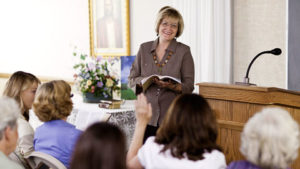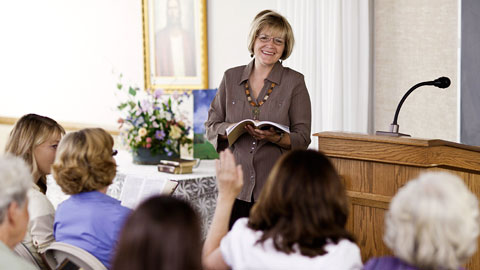 Mormonism provides numerous opportunities for us to teach each other. But, as we know, many times our Sunday classes fall short of being wonderful, too often failing to convey new or important insights, and hardly ever yielding transformative classroom experiences. How can we change this? How can we as teachers or class members move us into more enriching territory?
Mormonism provides numerous opportunities for us to teach each other. But, as we know, many times our Sunday classes fall short of being wonderful, too often failing to convey new or important insights, and hardly ever yielding transformative classroom experiences. How can we change this? How can we as teachers or class members move us into more enriching territory?
A second issue arises for teachers and class members whose faith journeys have led them to more complex views of LDS history, theology, or culture than is typically presented in the lesson manuals or anticipated by others in their various replies to questions asked during the class session. How can we who fit within this category, with integrity, teach within the church? How can we signal our willingness to engage the lesson manual materials while still seeking to reach a bit higher or offer perspectives that might lead to new thinking or deeper examination? How can we negotiate the expectations we sense from many to deliver the “safe” or the “usual” material with our own sense of being called to try for more?
This two-part episode tackles these issues and more, and features two wonderful and experienced and thoughtful teachers within Mormonism, Kristine Haglund and Stephen Carter, along with Mormon Matters host Dan Wotherspoon. What are their best ideas for structuring classroom experiences? For preparing ourselves to teach within the church or share from the seats? For overcoming the fear of possibly falling flat on our face and/or being released for overreaching and offering challenging perspectives that those in leadership feel are a bit too much? What are some of the ways they have negotiated these hurdles in their own gospel lives? What great classroom experiences do they point to as highlights and approaches that might inspire all of us to work to be more effective gospel teachers?
_____
Links:
Kristine Haglund, “What I Wish I had Said, Part 26 or So,” By Common Consent blog, 3 July 2011
Stephen Carter, “How to Use the Total Perspective Vortex in Your Very Own Sunday School Class,” Sunstone, March 2005


Comments 5
Can we get a list of principles that were expressed in the podcast?
There were many great ones. Perhaps Steven or Kristine have some notes they brought to the program.
Thanks. Loved the show
If at all possible, set the chairs up in a circle.
Ask questions that imply multiple answers.
Avoid judgment statements in your questions.
Build the word “you” into your questions to invite class members’ personal experiences. Note who reacts to a response and ask them what they were thinking.
Prepare a messy story of your own that will make room in the discussion for honesty.
Gospel teaching is about understanding each other, not understanding a concept. As Teaching in the Savior’s Way says, “Focus on people, not lessons.”
Thanks Stephen.
Great tips.
I was disappointed that this was wholly focused on teaching adults. Most teachers are teaching children and youth. I teach the Deacons and find it challenging to hold back some things that I’d like to share with them.
If you ever have another episode on teaching youth, I’d be happy to share my insights and experiences.
Another great one! It remeinded me of a class I took this summer. It was a teaching class geared toward k-2nd grades, but there was a handout on asking effective questions that was fantastic! I used it in teaching RS and had some really great discussions. I am including the link below, I hope it works. If you scroll down there are great example questions that just need a little twist to apply to any class you can teach in the church, home or any situation.
file:///C:/Users/english/Downloads/CBS_AskingEffectiveQuestions%20(4).pdf
(hope it works!!)